Even after a thorough cleaning, the plughole may be the source of an unpleasant smell in the kitchen. Anyone would avoid eating if the kitchen sink smelled bad, but what can you do about something you can’t even see? In this how to get rid of bad smell under kitchen sink article, we’ll examine the main reasons why your kitchen sink is smelling bad as well as what you can do to stop the smells from returning.
Can you get rid of the bad smell under the kitchen sink? YES, definitely. There are numerous ways to get rid of odor, let’s have a look at the ways you can make sure your kitchen is odorless.
What Causes are Smells Coming from the kitchen sink?
Your kitchen sink is emitting a bad odor for three main reasons.
- Clogged Pipe: Over time, a buildup of food and debris in your pipes may begin to rot and smell. Anything you put down the sink besides water runs the risk of sticking to the U-bend or the pipes. The odor will rise through the pipes as this food and debris decompose.
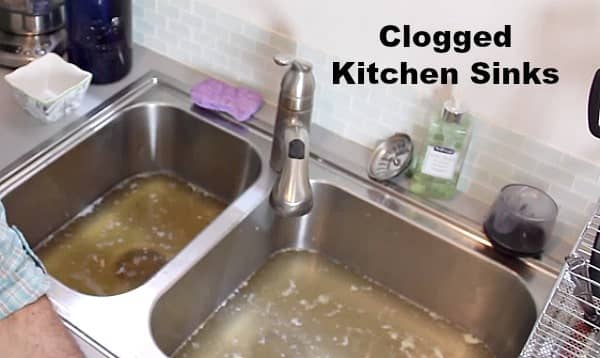
- U-Bend Leakage: You might notice odors coming from the sewer pipes if there is no water in the U-bend. This may occur if your U-bend has a leak or if the water evaporates in a hot climate.
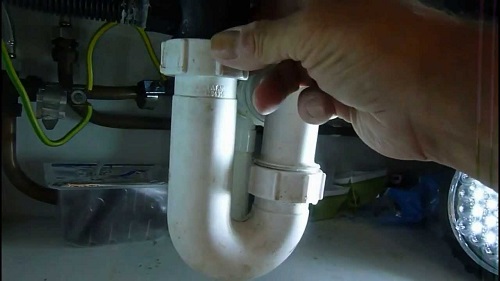
- Mold: In rare instances, a buildup of mold may cause your kitchen sink to smell.

Similar Post: How to Caulk a Stainless Steel Kitchen Sink
How to Stop a Stinky Kitchen Sink?
The smell of the kitchen sink won’t go away on its own. Once you are aware of the cause, you can use one of the solutions listed below to fix the issue. To clean your pipes, you have a DIY method and a chemical cleaning method to pick from. Additionally, we have some advice for resolving issues with your U-bend.
Step 1: Boiling Water
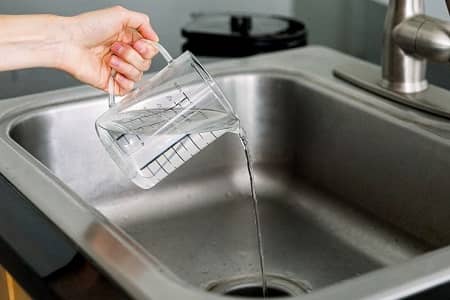
Pouring boiling water down your drain might be all that’s required if the obstruction is due to a buildup of fats and oils.
- Bring the water to a rolling boil in the kettle or a pan.
- Pour it into the plughole gradually, taking care not to splash yourself.
- Wait five minutes.
- Run the cold water faucet to make the oil congeal and drain.
Step 2: White Vinegar
Because it is affordable, easily accessible, and an all-natural odor-killer, vinegar is a preferred cleaning product.
- Fill the plughole with half a cup of vinegar.
- Make sure you don’t use the sink for the following 30 minutes as you should let it stand.
- Pour hot water through the faucet to clean the pipes.
Step 3: Baking Soda & Vinegar
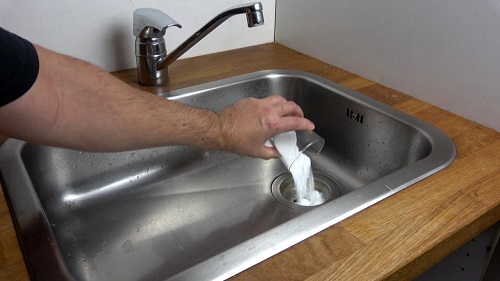
Try combining vinegar and baking soda for a deodorizing effect if you need more force to clear the obstruction.
- Half a cup of baking soda should be poured down the plughole. Pour it slowly to prevent it from pooling in the sink and instead allow it to drain.
- Now, insert the plughole with a cup of vinegar. You ought to see it foaming and hear it fizzing.
- Make sure you don’t use the sink for a few hours while the solution is soaking.
- The kettle should be filled and brought to a boil. To flush out any remaining debris, pour this water down the plughole.
Step 4: Chemical Drain Cleaner
Chemical drain cleaners are widely available in DIY stores and supermarkets. To remove any debris, you can use either a bio-enzyme cleaner or a commercial drain cleaner.
- In order to unclog the drain, a bio-enzyme drain cleaner “eats” the food blockage. This is the best option if you are worried about the effects of pouring chemicals down the drain on the environment because it is non-toxic and eco-friendly.
- A pre-made drain cleaner uses chemicals to unclog the blockage and get rid of the odor. These can be dangerous due to the chemicals they contain. It’s crucial to use chemical cleaners according to the directions on the packaging.
Step 5: Resolve issues with the U-bend
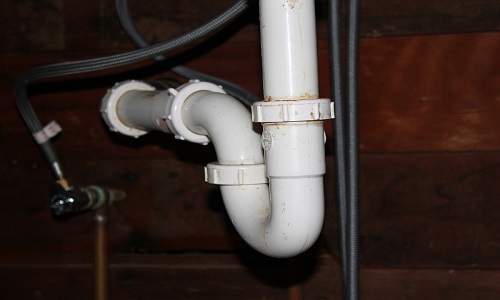
As your first line of defense against sewer odors, the U-bend is also sometimes referred to as a sewer gas trap. Checking the U-bend may be necessary if you have tried the aforementioned solutions and your kitchen sink is still emitting a foul odor. Your U-bend is probably to blame if the air smells like rotten eggs.
To operate efficiently, the U-bend needs water. The water in your pipes may have evaporated if you haven’t used your sink in a while because you were away. To refill with water, you only need to turn on your faucets.
A U-bend leak is an additional possible issue. For leaky signs, look under your sink. You might need to call a plumber if the area under your sink is damp.
You must take the U-bend apart and use a wire brush to clean it if there is an obstruction inside.
You May Also Read About: How to Remove Chemical Stains from Stainless Steel Sink
How to Prevent Future Odors Coming from the Kitchen Sink?
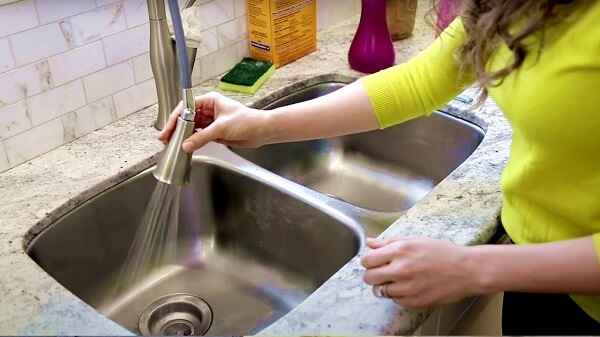
After the smell in your sink has disappeared, you should take precautions to prevent it from happening again. To prevent odors, try the following:
- To stop large food pieces from falling down the plughole, use a drain screen.
- Avoid pouring grease or other liquids directly into the plughole.
- To get rid of any bacteria, periodically pour the leftover water from the kettle down the plughole.
- Make it a routine to flush baking soda down your plughole once a week and when you are leaving the house.
- To deal with odors that won’t go away, call in the experts.
If Nothing Else Works…
Even after using these remedies, rotten food is probably not the source of the odor in your sink. Sewer lines may be clogged if you smell sewage. Additionally, clogged drains are a cause for concern, particularly if they are located throughout your home. To investigate the issue, contact a plumber.
Other things, such as grease or soap scum, could clog your kitchen sink, but these methods ought to remove that gunk.
That concludes our article on how to get rid of bothersome sink odors. Most households should already have some of the cleaning supplies mentioned in this article. It should only take a few minutes to clean your sink drain. Although it’s not particularly enjoyable, you’ll be happy when it’s over. Lucky you!